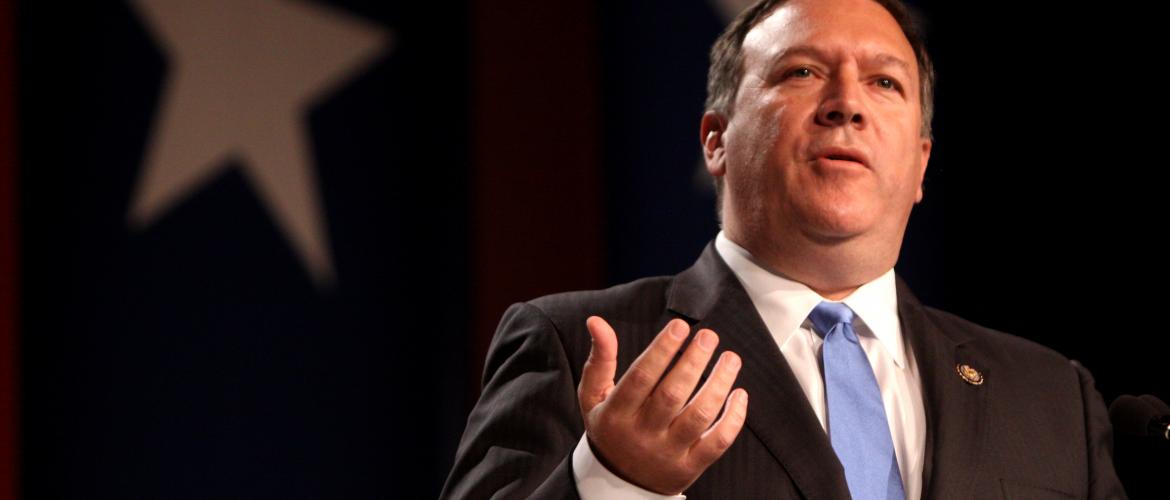Pompeo visits Russia
May 17, 2019 | Expert Insights

Background
The United States and the Soviet Union, the predecessor to the Russian Federation, were engaged in a competition for power following the Second World War. This period, known as the Cold War, saw a contest for supremacy in the military, economic and world affairs. The end of the Cold War and dissolution of the Soviet Union were touted as an end to this period of the competition. However, this analysis proved to be untrue as Russian President Vladimir Putin sought to revive the power of the country.
Relations between Russia and the US deteriorated in 2014 when Russia annexed Crimea. It cited a controversial referendum for doing so. As a result, President Barack Obama and his EU allies unveiled a coordinated set of sanctions against Russia and ordered it to leave Crimea. Russia responded with counter-sanctions.
Russia’s alleged interference in the US Presidential elections has further caused tensions in the ties. Despite Russia’s repeated denials, US imposed harsh sanctions on Russia. The potential for conflict has escalated as Russia and America find themselves on opposite sides in Venezuela, Syria, Ukraine, Iran and several other issues, such as arms control.
Analysis
US Secretary of State, Mike Pompeo, recently undertook an official visit to Russia. He met with Russian Foreign Minister Sergey Lavrov at Sochi, hoping to find common ground on strategic issues around the world. In a joint press conference after the meeting, Mr Pompeo called on Russia to end support for Venezuelan President Nicholas Maduro. Moscow rejected his call, with Mr Lavrov saying that Venezuela’s future must be decided by its people, calling American pressure on Mr Maduro undemocratic.
Regarding Iran, the statements made by both parties highlighted their differences. Russia specifically criticised the US’ decision to unilaterally withdraw from the Joint Comprehensive Plan of Action (JCPOA), which was meant to temper Iran’s nuclear program. Washington’s decision to revoke key sanctions waivers on Iran also received Mr Lavrov’s disapproval.
On Ukraine, Washington indicated that it would continue to oppose recognition of Moscow’s annexation of Crimea. It would keep in place sanctions imposed on Russia following the seizure. Mr Pompeo specifically called upon Moscow to free Ukrainian sailors captured by Russia, urging the country to work with Ukraine’s new president to bring peace to the region.
Arguably the most contentious topic for Mr Pompeo was accusations that Russia interfered in America’s 2016 presidential election. The visit by the Secretary of State is the first high-level contact between Moscow and Washington after US Special Counsel Robert Mueller submitted a report that investigated Russia’s role in the 2016 elections. Analysts were carefully watching for Mr Pompeo to deliver strong rhetoric against continued Russian interference in future American elections. Mr Pompeo said that any such interference “would put our relationship in an even worse place.”
Mr Putin said he would like to “fully restore” relations with the US. He said he arrived at this conclusion after a recent phone call with President Trump. Mr Putin even praised the Mueller report, claiming that it did not show any collusion between the US administration and Russia. Russian officials indicated that there was now more scope to build friendly relations following this perception of exoneration.
Mr Pompeo’s meeting with Mr Lavrov was expected to feature several topics, including arms control. America and Russia have recently withdrawn from bilateral arms treaties, especially those that regulate strategic nuclear weapons. However, recent events in the Persian Gulf, including Iran’s impending non-compliance with the JCPOA, took centre stage. This is expected to continue to dominate US-Russia relations as Moscow continues to maintain economic and security ties with Iran. Moscow will use its relationship with Tehran as leverage in future talks with the US.
Russian officials said that Mr Trump and Mr Putin are scheduled to meet on the sidelines of the upcoming G20 meeting in Osaka, although the US has yet to make a formal request. Previously, President Trump had cancelled talks with President Putin at the last G20 following a Russian attack on several Ukrainian ships.
Assessment
Our assessment is that the relationship will remain muted for the present. We believe that Russia and the US will continue to support opposing ruling dispensations countries like in Iran, Venezuela, Ukraine and Syria with diverging geo security interests. We feel that renewed contact between the US and Russia may yield some progress on arms control, even though the current situation in Iran is worrisome. We also believe that Mr Trump’s might still desire to build closer ties with Mr Putin, whom he had praised during the 2016 campaign.
We believe it is important to note that before Mr Putin met Mr Pompeo, he had visited a defence plant that produced new hypersonic missiles that America views as a threat. Although the Kremlin played down the timing of the visit as a coincidence, Mr Putin intends to signal to America that Russian will continue to develop its missile capability as the strategic arms control treaties has been withdrawn.
Image Courtesy - Gage Skidmore [CC BY-SA 3.0 (https://creativecommons.org/licenses/by-sa/3.0)]








Comments